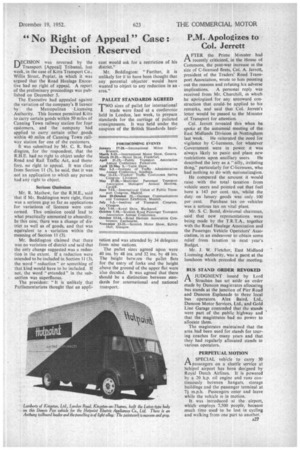"No Right of Appeal" Case : Decision Reserved
Page 29

If you've noticed an error in this article please click here to report it so we can fix it.
flECISION was reversed by the J—/ Transport [Appealj Tribunal, last week, in the case of Kitts Transport Co., Willis Street, Poplar, in which it was argued that the Road Haulage Executive had no right of appeal. A report of the preliminary proceedings was published on December 5.
The Executive had appealed against the variation of the company's B licence by the Metropolitan .Licensing Authority. This licence permitted Kitts to carry certain goods within 50 miles of Canning Town railway station for fotir customers, and the company • had applied to carry certain other goods within 40 miles of Canning Town railway station for one of the customers.
It was submitted by Mr. C. R. Beddington, for the respondent, that the R.H.E. had no right to object under the Road and Rail Traffic Act, and therefore, no right to appeal It was clear from Section 11(3), he said, that it was not an application to which any person had any right to object.
Serious Omission
Mr. R. Mathew, for the R.H.E., said that if Mr. Beddington were right, there was a serious gap so far as applications for variations of licences were concerned. This omission could lead to what practically amounted to absurdity. In this case, there was a change of district as well as of goods, and that was equivalent to a variation within the meaning of Section 11(3).
Mr. Beddington claimed that there was no variation of distriet and said that the only change suggested was a reduction in the extent. If a reduction were intended lobe included in Section 11 (3), the word "reduction" or something of that kind would have to be included. If not, the word "extended" in the subsection was superfluous.
The president: " It is unlikely that Parliamentarians thought that an appli
cant would ask for a restriction of his district."
Mr. Beddington: "Further, it is unlikely for it to have been thought that any potential objector would have wanted to object to any reduction in an • area."
PALLET STANDARDS AGREED
TWO sizes of pallet for international trade were fixed at a conference held in London, last week, to prepare standards for the carriage of palleted consignments. It was held under the auspices of the British Standards Insti
tution and was attended by 34 delegates from nine nations.
The pallet sizes agreed upon were 40 ins. by 48 ins. and 32 ins, by 48 ins. The height between the pallet flats for the entry of forks and the height above the ground of the upper flat were "also decided. It was agreed that there should be a distinction between standards for international and national transport.




















































































